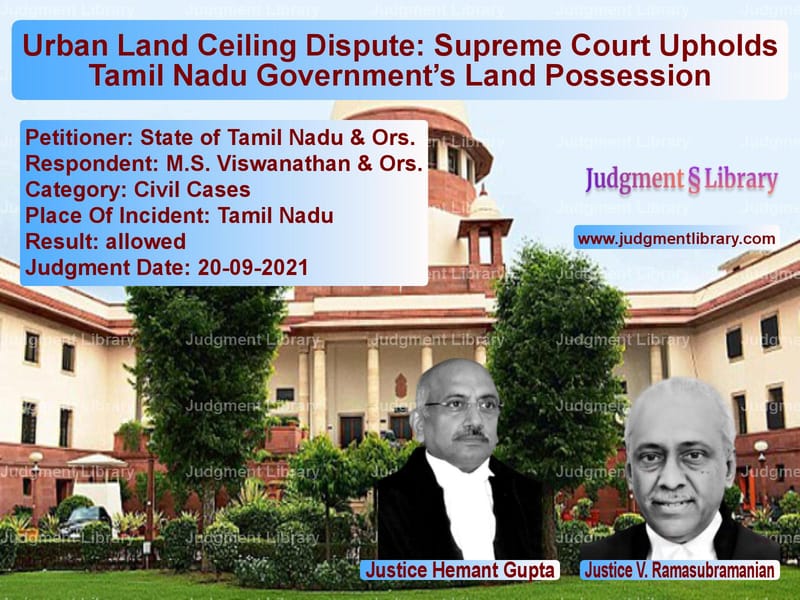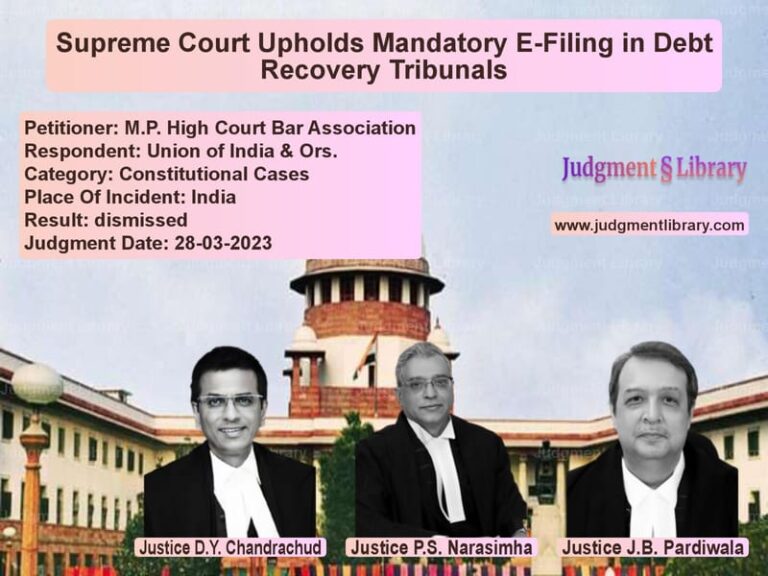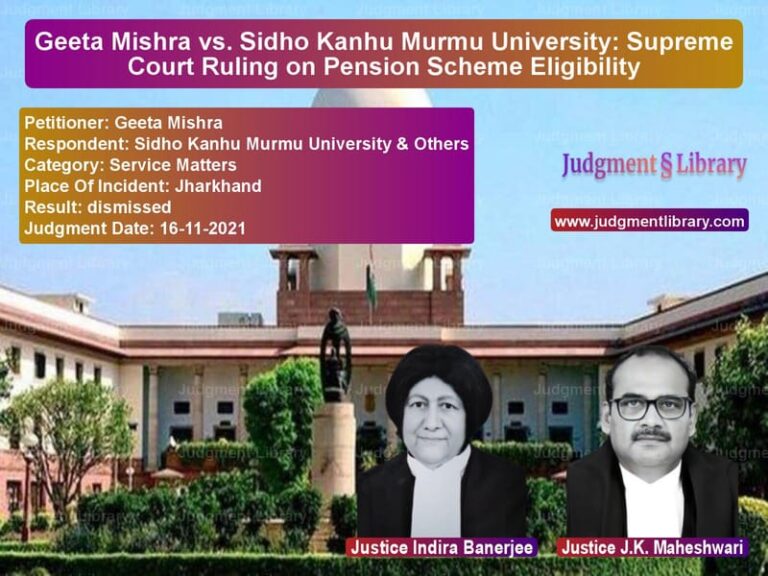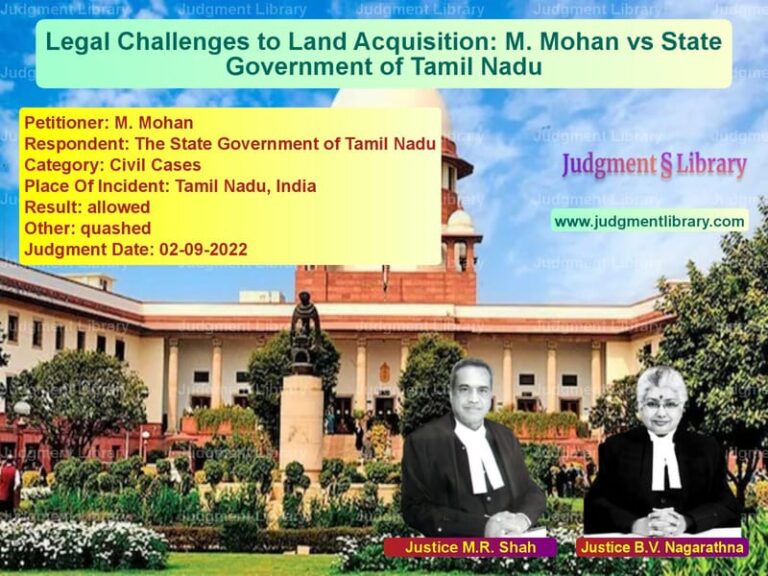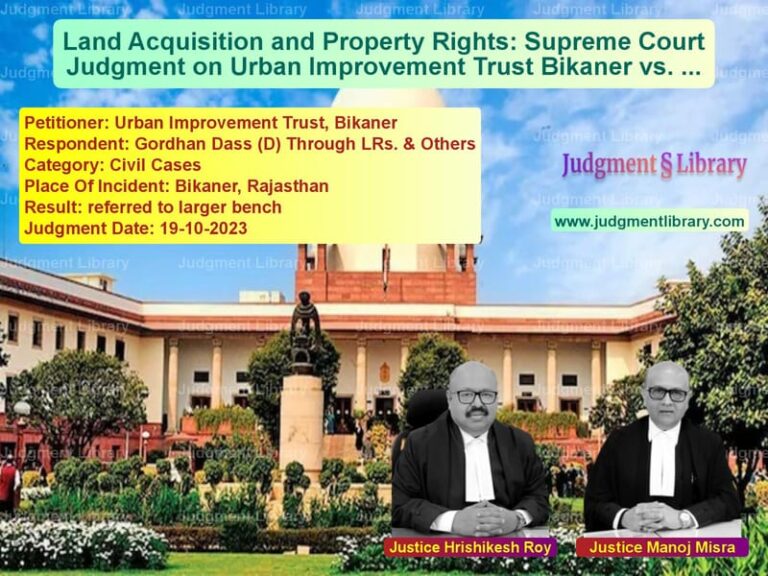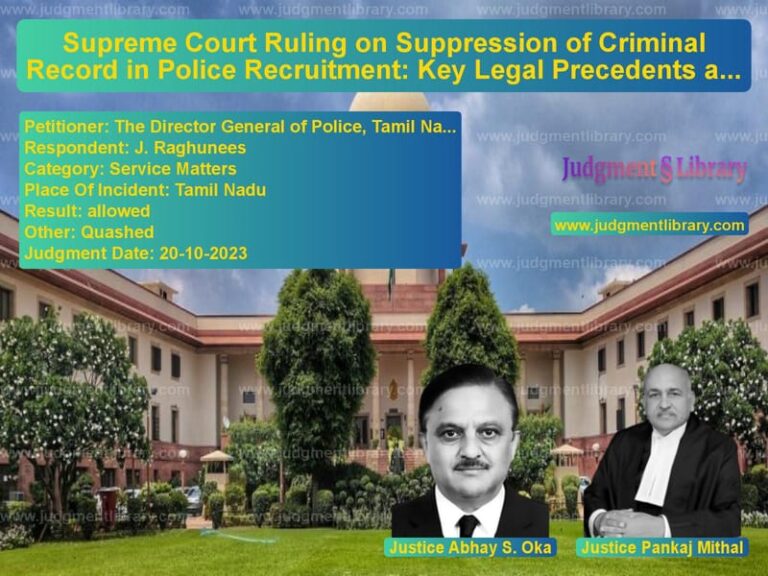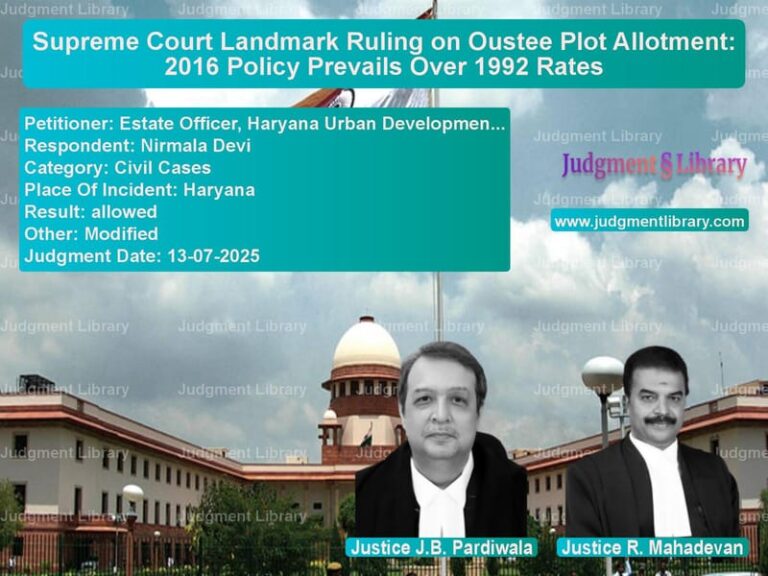Urban Land Ceiling Dispute: Supreme Court Upholds Tamil Nadu Government’s Land Possession
The case of State of Tamil Nadu & Ors. vs. M.S. Viswanathan & Ors. revolved around the Tamil Nadu Urban Land (Ceiling and Regulation) Act, 1978, and its repeal in 1999. The Supreme Court had to determine whether land acquired under the Act could be restored to the original owners post-repeal. The ruling set a significant precedent for urban land disputes and government land acquisition.
Background of the Case
The dispute arose when one Smt. Nagarathinam Ammal, who owned excess land under the Tamil Nadu Urban Land (Ceiling and Regulation) Act, 1978, filed a return under Section 6(1) of the Act. The government subsequently denied her exemption request and ordered her to surrender 6738 square meters of excess land. Following due process, the land was vested in the government and later allotted to the Madras Snake Park Trust, which eventually returned it to the government. The Forest Department later sought the land for environmental projects.
Following the repeal of the Urban Land Ceiling Act in 1999, Nagarathinam Ammal’s legal heirs filed a writ petition in 2004, seeking restoration of the land, claiming possession had never been taken by the government. The High Court ruled in their favor, prompting the Tamil Nadu government to challenge the decision before the Supreme Court.
Read also: https://judgmentlibrary.com/supreme-court-criticizes-repeated-adjournments-in-civil-litigation/
Legal Issues Raised
- Whether land vested in the government under the Urban Land Ceiling Act could be restored post-repeal.
- Whether physical possession had been taken by the government before the repeal.
- Whether the landowners’ claim for restoration was valid under the Repeal Act.
Petitioner’s Arguments (State of Tamil Nadu)
The State of Tamil Nadu, represented by senior counsel, argued:
- The land had already vested in the government before the repeal, and possession had been taken following due process.
- The original owner, Nagarathinam Ammal, voluntarily surrendered possession via a letter dated 11.11.1980.
- The government had allotted the land to the Snake Park Trust and later to the Forest Department.
- Since possession was taken before the Repeal Act, the original owners had no legal claim to the land.
Respondent’s Arguments (Legal Heirs of Nagarathinam Ammal)
The respondents, represented by their counsel, countered:
- The land was still vacant, enclosed by a compound wall, proving possession was never taken.
- Inspection reports from 1996 and 2005 confirmed that the land was unutilized, supporting their claim.
- The repeal of the Urban Land Ceiling Act nullified all previous proceedings, entitling them to restoration.
- The voluntary surrender letter was not conclusive proof of possession being taken.
Supreme Court’s Judgment
The Supreme Court ruled in favor of the Tamil Nadu government. The key findings included:
- The land had vested in the government under Section 11(3) of the Urban Land Ceiling Act.
- Possession had been voluntarily surrendered by Nagarathinam Ammal via a written statement.
- The High Court erred in relying solely on an inspection report without verifying official records.
- The legal heirs were involved in real estate dealings, indicating an attempt to exploit the repeal for commercial gain.
Key Observations by the Court
“The first paragraph of the letter dated 11.11.1980 contains a categorical statement that the owner was surrendering and delivering possession. She was merely asking for payment of compensation.”
“The High Court committed a grave error in granting the benefit of Section 3(2) of the Repeal Act to the respondents.”
Impact of the Judgment
- Reaffirmed that land vested in the government before repeal cannot be restored.
- Clarified the significance of possession in determining post-repeal claims.
- Set a precedent for future urban land ceiling disputes across states.
Conclusion
The Supreme Court’s ruling in State of Tamil Nadu vs. M.S. Viswanathan underscores the importance of government land acquisition laws and their finality. The decision ensures that vested government land remains under state control despite legislative changes, preventing fraudulent attempts to reclaim such land. The ruling strengthens the legal framework for urban land regulation and government land allotments.
Petitioner Name: State of Tamil Nadu & Ors..Respondent Name: M.S. Viswanathan & Ors..Judgment By: Justice Hemant Gupta, Justice V. Ramasubramanian.Place Of Incident: Tamil Nadu.Judgment Date: 20-09-2021.
Don’t miss out on the full details! Download the complete judgment in PDF format below and gain valuable insights instantly!
Download Judgment: state-of-tamil-nadu-vs-m.s.-viswanathan-&-o-supreme-court-of-india-judgment-dated-20-09-2021.pdf
Directly Download Judgment: Directly download this Judgment
See all petitions in Property Disputes
See all petitions in Landlord-Tenant Disputes
See all petitions in Contract Disputes
See all petitions in Succession and Wills
See all petitions in Judgment by Hemant Gupta
See all petitions in Judgment by V. Ramasubramanian
See all petitions in allowed
See all petitions in supreme court of India judgments September 2021
See all petitions in 2021 judgments
See all posts in Civil Cases Category
See all allowed petitions in Civil Cases Category
See all Dismissed petitions in Civil Cases Category
See all partially allowed petitions in Civil Cases Category

